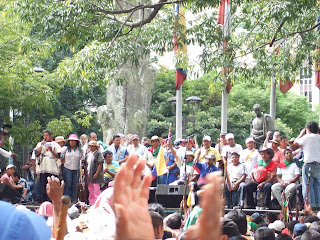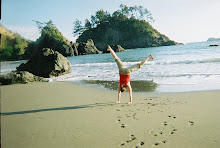One huge mobilization of the indigenous people of this area of Colombia began over two weeks ago. They were protesting for land that had been taken away from them and against the TLC (or free-trade agreement with the United States), among other concerns. Thousands of them marched down the Pan-American highway into Cali, carrying their typical symbol of the staff, which they held to connect to one another (like a long chain of people connected by large sticks). Sadly, under mysterious circumstances, two of them were shot and killed by the Colombian army along the way (even though it was a peaceful protest). Seven (including a child) had been killed recently at a demonstration outside of Bogotá (*not sure about the details*) , so it was certainly a risky endeavor! [There was also a protest in their name (although not by the indigenous themselves) by a group that always protests in the setting of Cali’s public university for all sorts of human-related issues (they just finished protesting in honor of the workers of sugar cane plantations). However, this group often becomes violent and destructive. It used “papa bombas” (potato bombs) that we could hear for two afternoons straight. It also left the nearby streets covered in broken glass, and several buses without tires.].
When the huge peaceful group of indigenous people arrived to Cali, we went to watch the rally at the local city center. Many of the participants wore their traditional attire, while others were clad in the modern gear of jeans and t-shirts. There were so many people that many had to climb into the trees to watch the speakers!
The president of the country (Álvaro Uribe) came all the way to Cali to address their concerns in person (it was the least he could do after so much had happened), but he arrived very, very late to their meeting point in the city center. Most of the indigenous people were offended by his late arrival and decided to leave in order to show how disrespectful he was to them. There were only a few people present when he arrived, and the stage had been destroyed. He was forced to talk through a microphone on a pedestrian bridge, and many people (who I actually don’t think they were indigenous) shouted rude insults at him. I know that they would have been “kindly escorted” away by the authorities had something like this happened in the United States, but they were allowed to continue their verbal attacks. President Uribe even responded to them, yelling back through his megaphone. He became particularly upset when these two particularly feisty hooligans began calling him a “paraco,” a term implying that he is involved with the paramilitary groups (Many, many members of the congress are being investigated for their connections to these right-wing violent groups, and rumors also claim that Uribe has ties to them as well). He shouted right back at the men, saying: “Don’t you ever, ever call me that again! If you want to say something, come up here and say something that’s productive!¨ He also made comments like, “Did you just invite me here to insult me?”







No comments:
Post a Comment